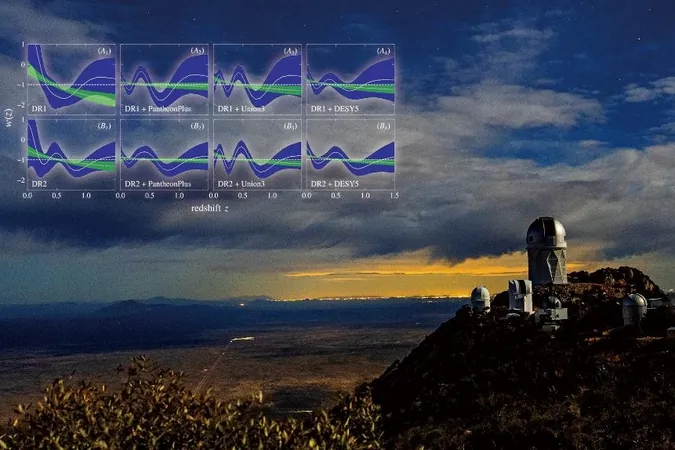
Astronomers Unveil Dark Energy Breakthrough, Unlocking Secrets of the Cosmos
2025-04-10
Author: Li
Astronomical Breakthrough in Understanding Dark Energy
In a groundbreaking achievement, a team of international astronomers, including researchers from China, has unlocked new insights into the puzzling phenomenon of dark energy, which is driving the accelerated expansion of the universe.
Announced by the National Astronomical Observatories of the Chinese Academy of Sciences (NAOC), this discovery hints at the possibility of new physics that challenges the standard cosmological model.
The Mystery of Dark Energy
Dark energy has confounded scientists since its discovery in the late 1990s, a mysterious force believed to make up a significant portion of the universe yet remains largely unexplained. While the existing model depicts dark energy as a static vacuum, emerging observational evidence is now revealing inconsistencies that call this framework into question.
As new data comes into play, the door is opening for alternative theories to explain this cosmic enigma.
The Role of DESI in Cosmic Exploration
Central to this breakthrough is the Dark Energy Spectroscopic Instrument (DESI), a collaborative effort among over 70 global institutions. With its advanced 4-meter optical telescope, DESI is mapping the large-scale structure of the universe, measuring the redshifts of millions of celestial objects.
Revolutionary Findings on Dark Energy Dynamics
In a landmark study led by Zhao Gongbo, the team made strides in understanding the dynamic properties of dark energy. Utilizing a cutting-edge methodology, they combined observational data from DESI with supernovae measurements and cosmic microwave background radiation.
Their analysis indicates that the equation of state for dark energy evolves as the universe ages, suggesting that it isn’t a simple static entity after all.
A New Chapter in Cosmology
The implications of these findings are significant, marking a new phase in dark energy research. Well-known academician Chang Jin of NAOC lauded the results, emphasizing the potential for revolutionary advancements in both observational techniques and theoretical models.
Dragan Huterer, a physicist at the University of Michigan and part of the DESI team, described the research as a critical step toward deepening our understanding of dark energy.
Future Endeavors and Collaborations
Looking ahead, Zhao’s team plans to delve deeper with the complete dataset from DESI, collaborating with international experts to further investigate the dynamic nature of dark energy through precise measurements.
The NAOC also aims to bolster partnerships with leading astronomical institutions, leveraging cutting-edge technologies like big data and deep learning, while speeding up the development of next-gen observational tools.
The Global Impact of DESI
Managed by the U.S. Department of Energy's Lawrence Berkeley National Laboratory, DESI involves over 900 researchers from around the world, exemplifying the spirit of international collaboration in addressing one of the universe’s biggest mysteries.



 Brasil (PT)
Brasil (PT)
 Canada (EN)
Canada (EN)
 Chile (ES)
Chile (ES)
 Česko (CS)
Česko (CS)
 대한민국 (KO)
대한민국 (KO)
 España (ES)
España (ES)
 France (FR)
France (FR)
 Hong Kong (EN)
Hong Kong (EN)
 Italia (IT)
Italia (IT)
 日本 (JA)
日本 (JA)
 Magyarország (HU)
Magyarország (HU)
 Norge (NO)
Norge (NO)
 Polska (PL)
Polska (PL)
 Schweiz (DE)
Schweiz (DE)
 Singapore (EN)
Singapore (EN)
 Sverige (SV)
Sverige (SV)
 Suomi (FI)
Suomi (FI)
 Türkiye (TR)
Türkiye (TR)
 الإمارات العربية المتحدة (AR)
الإمارات العربية المتحدة (AR)